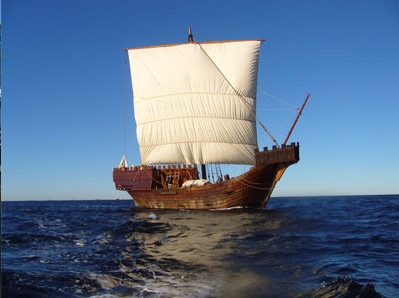Royal letters and the wreck of a 'Danskynn schipe' are among the rich details of life in the 1530s revealed in an online database built by the Aberdeen Burgh Records Project which is being launched today (6 May 2014).
The project is a partnership between the University of Aberdeen and the Aberdeen City and Aberdeenshire Archives, and is funded by the Research Institute of Irish and Scottish Studies (RIISS) with additional support from the Medieval History Research Centre at Trinity College Dublin.It investigates the City’s ancient UNESCO-recognised council registers.
Named for Danzig (modern Gdansk), the Danskynn ship was skippered by Hans John, and was wrecked in bad weather off of the ‘haly mannis coif besyd abirdeinn’ (that is, modern Cove) on Saturday, 8 October 1530. The skipper survived and sought help from the provost of Aberdeen, Gilbert Menzies. He arrived at Menzies’s home at six o’ clock just as the provost sat down to his ‘soupar’. Pilots were sent to assist the broken ship the next morning. The king, James V, himself became directly involved when accusations were made that the ship’s cargo had been plundered.
The two royal letters, copied into the council registers, show that the king wrote from Brechin to the sheriff of Aberdeenshire, and to Aberdeen officials, on 13 October 1530. The king’s presence at this time in Brechin is not mentioned elsewhere. Although the wreck happened off the coast of Kincardineshire, the king commanded the officials of Aberdeen and the sheriff of Aberdeenshire to assist the sheriff of Kincardineshire (William Keith, Earl Marishcal) in ensuring the safety of the cargo, as some of the goods had been stolen and brought ‘baith to burgh and to land’.
Dr Edda Frankot, the project’s research assistant, said: “There is no indication of the goods carried by the ship but cargoes arriving from the Baltic Sea ports typically included grain, tar, timber and potash. Wrecks were not uncommon near Aberdeen’s harbour, and ships had to navigate around a sandbank at the entrance.”
The project is a pilot led by Dr Jackson Armstrong and Dr Andrew Mackillop of the Department of History. The database links a new transcription of 100 pages from council register Volume 13, to images of the original source. Six months of council business are captured, running from October 1530 to March 1531. Themes which have emerged from the project include the role of law and authority, and the relationship of Aberdeen to its landward and maritime hinterlands.
Dr Armstrong said: “The Danskynn episode and the links between town, nobility and crown in the response to the wreck capture very succinctly the legal, local, national and international context we are exploring in these tremendously important records.”
Aberdeen’s council registers survive in near-unbroken sequence from 1398 onwards and are the earliest and most complete series of records for any Scottish town. In 2013, UNESCO recognised their significance by including the first eight volumes in the UNESCO UK Memory of the World Register. 5,238 pages from those early volumes are currently available on the ScotlandsPlaces website.
Phil Astley, City Archivist said: “The launch of the database marks an important milestone for this collaborative project. The prospect of expanding access to these collections, and to fostering new investigations of their contents, is truly exciting.”
As the RIISS pilot comes to a conclusion, the potential of these records as a major historical resource that can be explored in multiple ways has been underlined by the start of a new phase of research, funded by dot.rural, the RCUK Digital Economy Hub, in a project led by Dr Adam Wyner of the Department of Computing Science. This new project aims to explore the town’s interaction with its rural hinterlands and the use of legal concepts and terminology through the use of text analytic tools.
For more information about the Aberdeen Burgh Records Project, and to access the database, please visit: http://www.abdn.ac.uk/riiss/about/aberdeen-burgh-records-project-97.php


